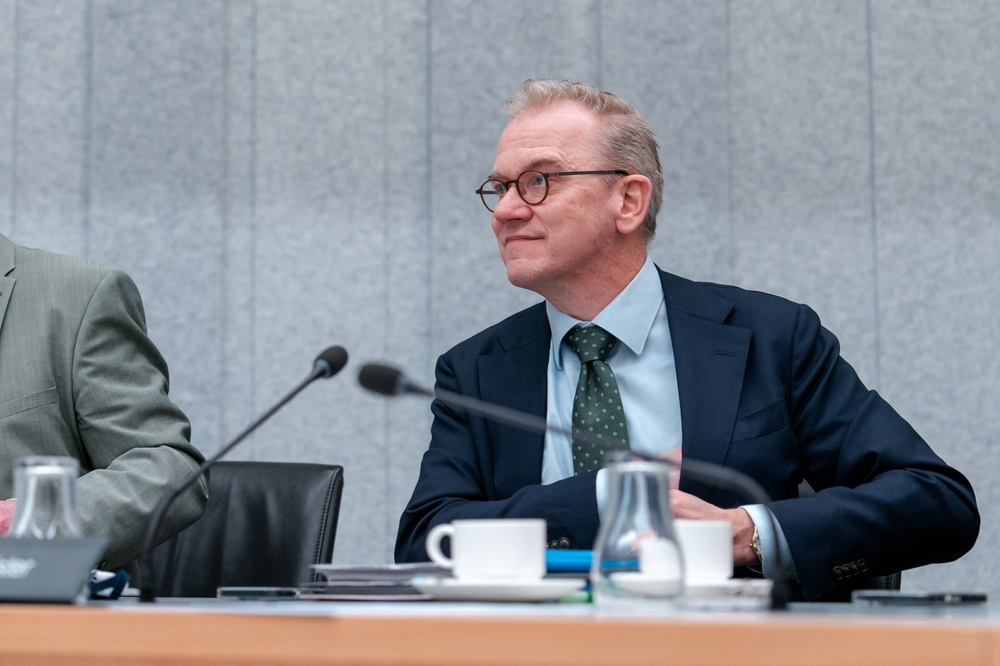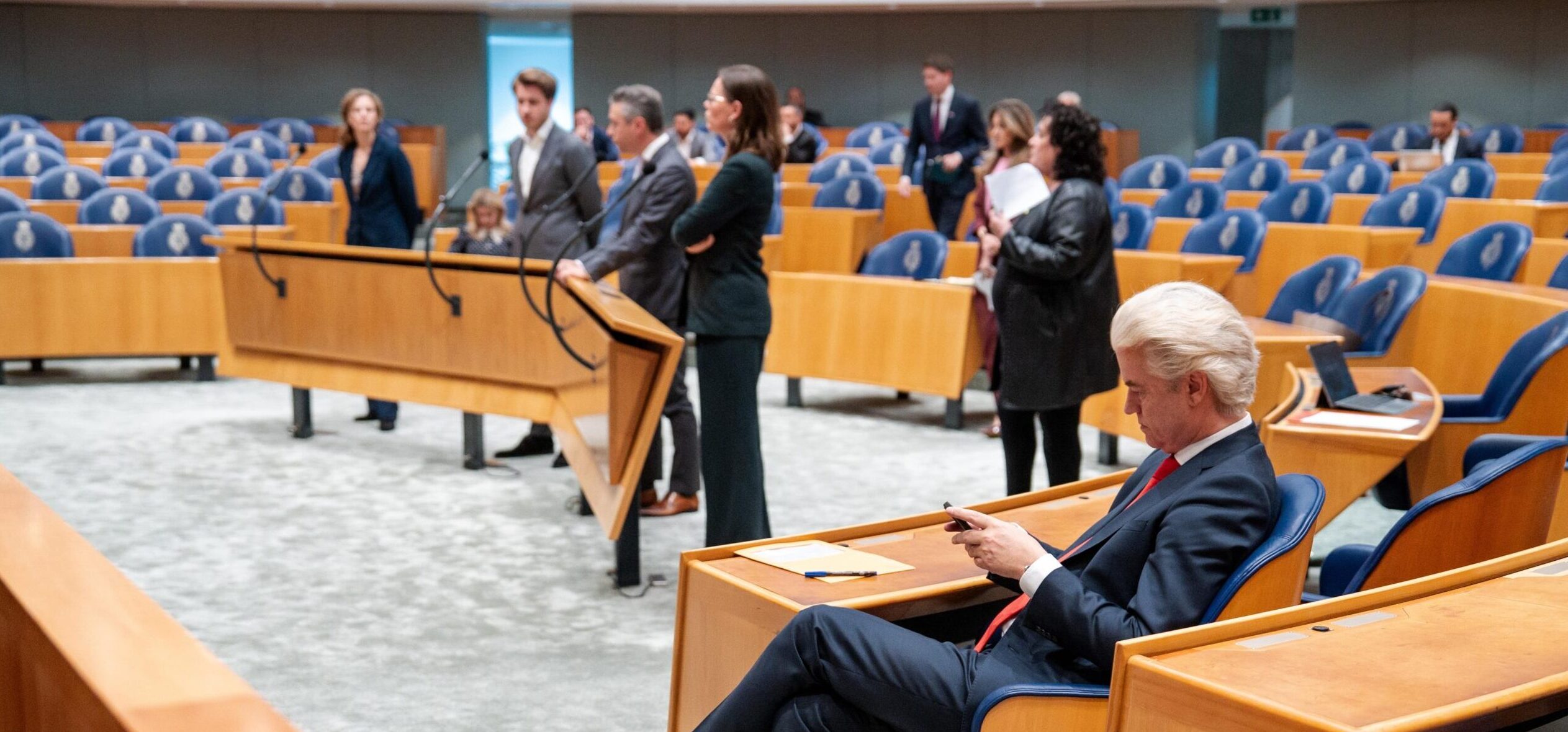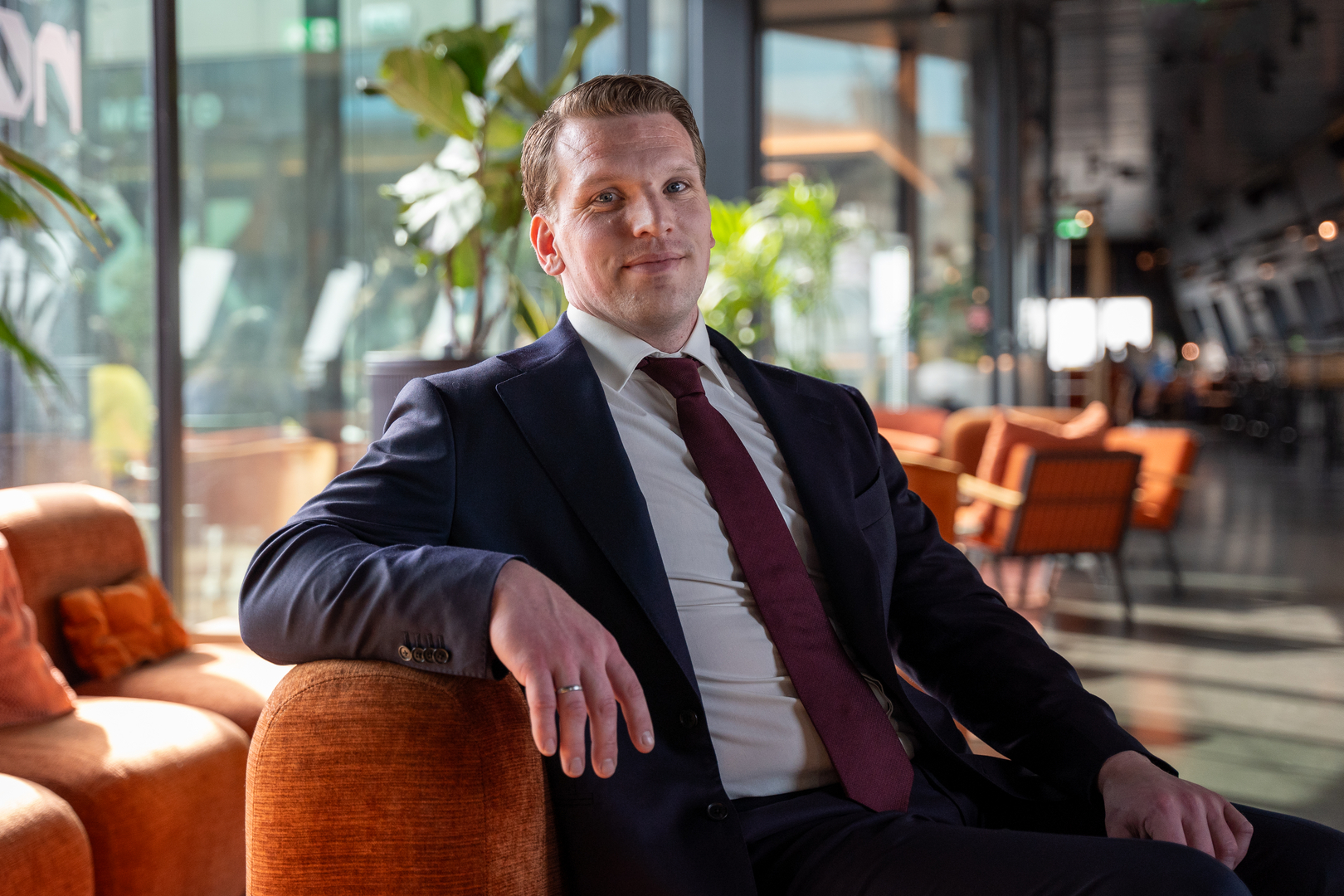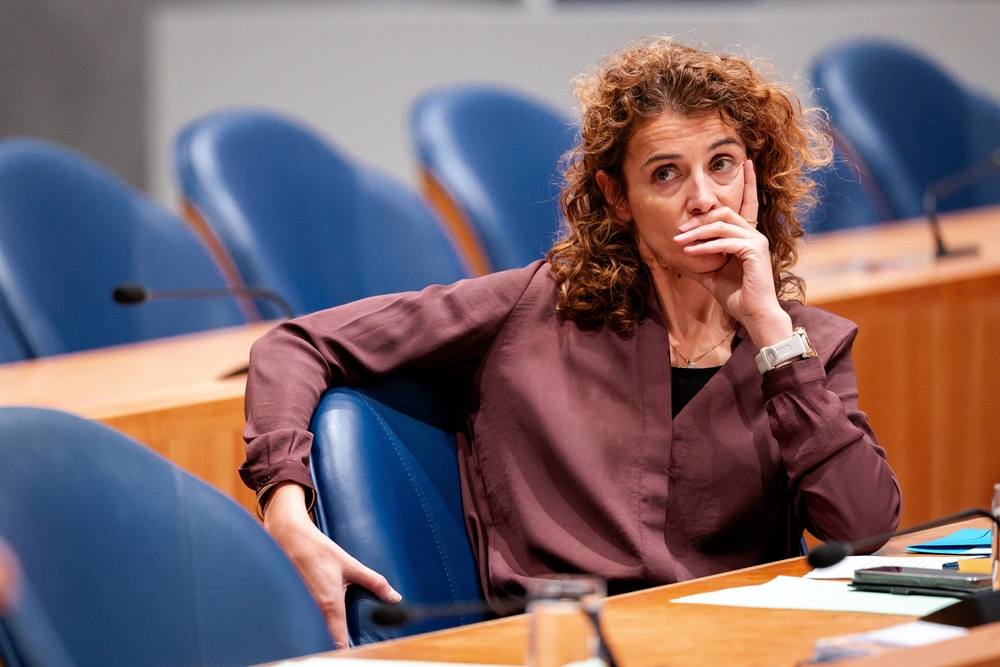The minister of education should have less power, says education minister Bruins. He fears that populists will want to intervene in higher education after the elections. ‘Entire faculties could have been cut.‘
Minister Bruins often called his own billion-euro cutbacks in education, culture and science ‘painful’ and ‘ugly’. Now he’s thanking his ‘opponents’: ‘Thanks to the opposition and other friends of education, education is in better shape than it was eleven months ago.’
Following long coalition negotiations, Bruins was asked to become Minister of Education. In doing so, he signed off on considerable cutbacks, such as a controversial slow-progress penalty for students who are taking too long to complete their studies. But he isn’t exactly sad that ‘his’ measures were softened or disappeared under pressure from mass demonstrations and fierce political opposition.
‘Useless science’
Geert Wilders’ PVV has removed itself from the government, new elections have been called and Minister Bruins feels free to say what he thinks of the populist tendencies in The Hague. ‘In this political climate, entire faculties or departments could simply have been cut, for being considered useless science.’
There has been plenty to discuss since he took office, but Eppo Bruins rarely allows himself to be interviewed. Last Wednesday, he made some time for HOP. He wants to warn against politicians undermining the rule of law, he says after a meeting on autonomy in higher education.
In this government, reasonable forces have ensured that our rule of law continues to function properly
How much power do you want to give a minister in populist times? Bruins: ‘Beware of too much interference in higher education. Before you know it, politics is going to have an opinion in the matter. We’re concerned when we look at the US, but I think we weren’t far from having the same state of affairs here in the Netherlands. Here, we also have people who say public broadcasters are biased and can be cut altogether. As well as people who say science is just an opinion.’
You suggest that we were very close to heading down the same path as the US with your government.
‘I’m not saying anything happened specifically. But we now have political parties and a political climate in the Netherlands where science that’s held in high esteem and having public broadcasters aren’t a given. In this government, reasonable forces have ensured that our rule of law continues to function properly.’
And NPO (the Dutch public broadcasting system) was almost cut altogether?
‘People in Hilversum breathed a sign of relief when it turned out NPO would only be cut by a hundred million euros. Everyone knows there were also very different scenarios on the table.’
That sigh of relief wasn’t breathed by the universities.
‘No, because the cutbacks amounting to almost a billion euros in higher education weren’t a let-off. Those cutbacks were very ugly.’
You are warning us that universities are in the firing line.
‘That’s correct and that’s why we need to make it clearer that higher education and science are there for society. In my period as an outgoing minister, I want to start the conversation on this.’
Why?
‘Part of the political spectrum mainly sees academic freedom, press freedom, educational freedom or the freedom of creative creators as a nuisance. It’s for good reason that I keep emphasising the rule of law in all my communications and debates. And the rule of law is all of us. It means taking the Council of State seriously, taking advisory councils seriously, taking parliament seriously, but also taking science seriously as a robust way of gathering knowledge. There are parties that look at this differently and simply say: this is my opinion, so this is what we’re going to do. If you give even more space to this way of thinking in the next elections, you’ll get very close to the state of affairs in the US.’
You say we should distrust politicians, but you yourself, as a politician, are responsible for the cutbacks at universities. That’s quite a remarkable message.
‘Politicians have to make choices about the future of the country. For example, we choose to allocate more money to defence and put more money in people’s pockets. That costs a lot of money and one way we’re paying for it is by cutting education and research. I think this policy is implementable, although it does also include an ugly measure on the equality of opportunity in education scheme in secondary education. It’s now up to the House to decide whether it wants to make extra room for education and science.’
‘I’m very clear on this: politicians are responsible for how we handle taxpayers’ money, but they shouldn’t interfere with the content. I want the minister to have less power at the end of my term, not more power. I want less influence on the media authority. I want less influence on science policy. I want less influence on what a journalistic code looks like. Those are all things politicians shouldn’t have a say in.’
Crossing the limits
Over the past year, the limits have regularly been tested. Parties like BBB and PVV directly attack public broadcasters or universities. But parties like VVD also cross the limits sometimes, as far as Bruins is concerned.
Against the background of the pro-Palestinian ‘riots’ in April, Claire Martens, the higher education spokesperson of the party concerned, asked him whether he could discuss the security policies at universities with their supervisory boards. Martens’ reasoning being that he appoints those councils, after all.
In theory, I can dismiss supervisory boards. I refuse to do so
In writing, Bruins responded cautiously to that request, but now he’s more firm about it. ‘The suggestion was that I should start calling out these supervisory boards. In theory, I could dismiss them. Quite frankly, I’m not going to do that. I refuse to.’
If you want less power, will you stop appointing supervisors at public universities?
‘Indeed, one might question if it’s wise that the minister appoints them. But those appointments are the result of open applications, following which I’m given one name that I can either approve or not. That process in itself means I have enough distance from the university. My signature is just the confirmation of a transparent process.’
Universities also see those parliamentary questions. Do they express their concerns to you about this?
‘No, not yet. But people also know by now that never in a million years would I intervene in this manner.’
You see yourself as one of the forces of reason. In what way have you saved higher education from going down the same path as the US?
‘I dare say I’ve had a protective role. Without trying to make myself sound bigger than I am. But I see myself as a guardian of the rule of law. I must do everything in my power to defend constitutional freedoms, now that there are people in politics who look at those very differently.’
You need to think carefully about whom you’re putting in my seat
‘Look, what’s happening in the US is extraordinary and won’t happen in the Netherlands anytime soon. We always have to think in terms of coalitions. But even then, you need to think very carefully about whom you’re putting in my seat. Whoever’s there doesn’t have the power of a US president, but you have to keep in mind that they may have very different views on science and journalism.’
And so we owe it to the opposition, you say, and not to your own government, that the coalition’s plans haven’t been fully implemented.
‘I said: thanks to the opposition and the many friends that education has. In the first two weeks, we as a government immediately saved the sector plans. And it was also government policy to make it clear how extraordinarily complicated it would be to introduce the slow-progress penalty. Again, thanks to the opposition and the many friends of education, including in the government, the point of departure for the next minister is better than it was when I took office eleven months ago.’
HOP, Olmo Linthorst
Also read:
The
minister of education should have less power, says education minister Bruins.
He fears that populists will want to intervene in higher education after the
elections. “Entire faculties could have been cut.” Minister
Bruins often called his own billion-euro cutbacks in education, culture and
science “painful” and “ugly”. Now he’s thanking his ‘opponents’: “Thanks to the
opposition and other friends of education, education is in better shape than it
was eleven months ago.” Following
long coalition negotiations, Bruins was asked to become Minister of Education.
In doing so, he signed off on considerable cutbacks, such as a controversial
slow-progress penalty for students who are taking too long to complete their
studies. But he isn’t exactly sad that ‘his’ measures were softened or
disappeared under pressure from mass demonstrations and fierce political
opposition. ‘Useless
science’Geert
Wilders’ PVV has removed itself from the government, new elections have been
called and Minister Bruins feels free to say what he thinks of the populist
tendencies in The Hague. “In this political climate, entire faculties or
departments could simply have been cut, for being considered useless science.” There
has been plenty to discuss since he took office, but Eppo Bruins rarely allows
himself to be interviewed. Last Wednesday, he made some time for HOP. He wants
to warn against politicians undermining the rule of law, he says after a meeting on autonomy in higher education. “In this
government, reasonable forces have ensured that our rule of
law continues to function properly” How much
power do you want to give a minister in populist times? Bruins: “Beware of too
much interference in higher education. Before you know it, politics is going to
have an opinion in the matter. We’re concerned when we look at the US, but I
think we weren’t far from having the same state of affairs here in the
Netherlands. Here, we also have people who say public broadcasters are biased
and can be cut altogether. As well as people who say science is just an
opinion.” You
suggest that we were very close to heading down the same path as the US with
your government.“I’m not
saying anything happened specifically. But we now have political parties and a
political climate in the Netherlands where science that’s held in high esteem
and having public broadcasters aren’t a given. In this government, reasonable
forces have ensured that our rule of law continues to function properly.” And
NPO (the Dutch public broadcasting system) was almost cut altogether?“People
in Hilversum breathed a sign of relief when it turned out NPO would only be cut
by a hundred million euros. Everyone knows there were also very different
scenarios on the table.” That
sigh of relief wasn’t breathed by the universities. “No,
because the cutbacks amounting to almost a billion euros in higher education
weren’t a let-off. Those cutbacks were very ugly.” You
are warning us that universities are in the firing line.“That’s correct
and that’s why we need to make it clearer that higher education and science are
there for society. In my period as an outgoing minister, I want to start the
conversation on this.” Why?“Part of
the political spectrum mainly sees academic freedom, press freedom, educational
freedom or the freedom of creative creators as a nuisance. It’s for good reason
that I keep emphasising the rule of law in all my communications and debates.
And the rule of law is all of us. It means taking the Council of State
seriously, taking advisory councils seriously, taking parliament seriously, but
also taking science seriously as a robust way of gathering knowledge. There are
parties that look at this differently and simply say: this is my opinion, so
this is what we’re going to do. If you give even more space to this way of
thinking in the next elections, you’ll get very close to the state of affairs
in the US.” “In theory, I can
dismiss supervisory boards. I refuse to do so” You
say we should distrust politicians, but you yourself, as a politician, are
responsible for the cutbacks at universities. That’s quite a remarkable
message.“Politicians
have to make choices about the future of the country. For example, we choose to
allocate more money to defence and put more money in people’s pockets. That
costs a lot of money and one way we’re paying for it is by cutting education
and research. I think this policy is implementable, although it does also include
an ugly measure on the equality of opportunity in education
scheme in secondary
education. It’s now up to the House to decide whether it wants to make extra
room for education and science.” “I’m
very clear on this: politicians are responsible for how we handle taxpayers’
money, but they shouldn’t interfere with the content. I want the minister to
have less power at the end of my term, not more power. I want less influence on
the media authority. I want less influence on science policy. I want less
influence on what a journalistic code looks like. Those are all things
politicians shouldn’t have a say in.” Crossing
the limitsOver the
past year, the limits have regularly been tested. Parties like BBB and PVV
directly attack public broadcasters or universities. But parties like VVD also
cross the limits sometimes, as far as Bruins is concerned. Against
the background of the pro-Palestinian “riots” in April, Claire Martens, the
higher education spokesperson of the party concerned, asked him whether he
could discuss the security policies at universities with their supervisory
boards. Martens’ reasoning being that he appoints those councils, after all. In
writing, Bruins responded cautiously to that request, but now
he’s more firm about it. “The suggestion was that I should start calling out
these supervisory boards. In theory, I could dismiss them. Quite frankly, I’m
not going to do that. I refuse to.” If
you want less power, will you stop appointing supervisors at public
universities?“Indeed,
one might question if it’s wise that the minister appoints them. But those
appointments are the result of open applications, following which I’m given one
name that I can either approve or not. That process in itself means I have
enough distance from the university. My signature is just the confirmation of a
transparent process.” “You need to think
carefully about whom you’re putting in my seat” Universities
also see those parliamentary questions. Do they express their concerns to you
about this?“No, not
yet. But people also know by now that never in a million years would I intervene
in this manner.” You
see yourself as one of the forces of reason. In what way have you saved higher
education from going down the same path as the US?“I dare
say I’ve had a protective role. Without trying to make myself sound bigger than
I am. But I see myself as a guardian of the rule of law. I must do everything
in my power to defend constitutional freedoms, now that there are people in
politics who look at those very differently.” “Look,
what’s happening in the US is extraordinary and won’t happen in the Netherlands
anytime soon. We always have to think in terms of coalitions. But even then,
you need to think very carefully about whom you’re putting in my seat.
Whoever’s there doesn’t have the power of a US president, but you have to keep
in mind that they may have very different views on science and journalism.” And
so we owe it to the opposition, you say, and not to your own government, that
the coalition’s plans haven’t been fully implemented.“I said:
thanks to the opposition and the many friends that education has. In the
first two weeks, we as a government immediately saved the sector plans. And it
was also government policy to make it clear how extraordinarily complicated it
would be to introduce the slow-progress penalty. Again, thanks to the
opposition and the many friends of education, including in the government, the
point of departure for the next minister is better than it was when I took
office eleven months ago.” HOP,
Olmo Linthorst Translation:
Taalcentrum-VU

 Eppo Bruins. Photo Shutterstock
Eppo Bruins. Photo Shutterstock 

